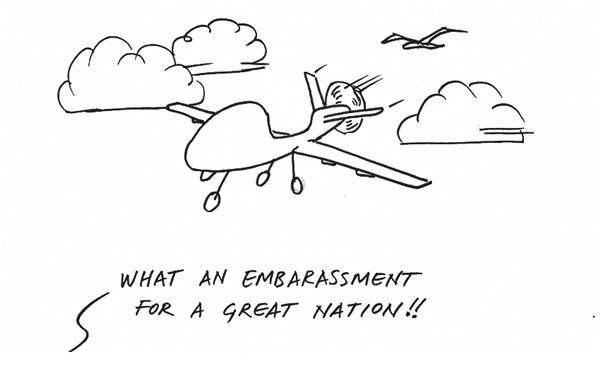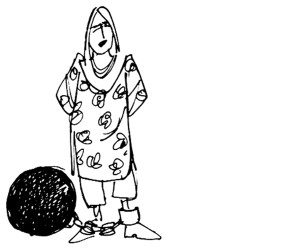
Prioritising quality in education
Sir,
It is true down to the core that ‘quality’ in education continues to be a victim of utter neglect, particularly in the public sector institutions of our country. The saddest part of this unfortunate state of affairs is that even after seven decades of our existence, no one at the helm in the government has ever bothered to keep a tab on this critical issue and resolve it with a sense of commitment and responsibility. Unquestionably, however, rhetoric vis-a-vis the vital issue of quality has always been at the top during the reign of successive governments in Pakistan.
The situation in other South Asian countries has not been better either. In fact, it has been equally poor. According to a World Bank report, “Student learning in South Asia – challenges, opportunities and policy priorities, “Many South Asian teachers hardly know more than their students. For example surveys from India and Pakistan show that performance of the teachers is abysmally poor in maths and language tests based on the curriculum they are supposed to teach.” It wouldn’t, therefore, be inappropriate to say that quality in education is one of the most critical challenges that South Asian countries are confronted with today. Pakistan too occupies a conspicuous position among them.
Quality, as stated earlier, continues to be an issue that gravely confronts education in our part of the world. One of the areas prioritised by the World Bank report on quality education is that learning outcomes should become the central goal of an education policy. Student learning in South Asia is far behind local and international standards. Students do not get even the basic numeracy and literacy skills after putting in a reasonable time in school. According to some assessments, the report says, about one third of primary school students lack the minimum level of numeracy and literacy skills needed to further their education in higher classes.
The report audaciously emphasises, “Schooling is successful when it enables students to lead fuller lives – as individuals and as labour market participants. For this to happen, merely spending time in school is not enough; there has to be a significant gain in cognitive and non-cognitive skills.” Yet another area prioritised by the report for quality education is ‘teacher effectiveness and accountability’. The report emphasises that level of motivation and methodology of teaching are two important determinants of teachers’ effectiveness. Teachers in Pakistan are found lacking on both these counts. They are a highly demotivated group. It seems as if the teaching profession has been thrust upon them. The reasons for this demotivation are obvious and need no further elaboration, the report says.
The gravity of the situation makes it incumbent on those engaged in policy making, in the education sector in the country, to put their heads together and find out as to what should be done to deal with this gargantuan challenge; a challenge that continues to unabatedly confront Pakistan even after seven decades of its independence.
M Fazal Elahi,
Islamabad.
Compromising our sovereignty
Sir,
The killing of Mullah Mansoor by an American drone within our territory has become an embarrassment for the political elite and our establishment. Perhaps it is time to set our own house in order. The foremost requirement is that our decision makers must have undivided loyalty to Pakistan, with no conflicts of interest, come clean and formulate policies through collective brainstorming by men with vision, intellect, knowledge and ethics, with no singular vetoing power for those whose sole authority comes from the barrel of a gun.
There have been too many and too frequent violations of our sovereignty, mostly with the consent of our self-assumed protectors of national interest. Allama Iqbal once stated, “Ever since their political fall, the Muslims of India have undergone a rapid ethical deterioration. Of all the Muslim communities of the world they are probably the meanest in point of character.” Strong words indeed, but very close to bitter truth and reality of self inflicted wounds to our national sovereignty. Other than greed or lust for power, there can be no justification for offering sanctuary to foreign fighters by Ziaul Haq in fighting a proxy war, which we should have never been involved in; or the manner in which Musharraf offered bases for drones to mount attacks and his self confessed crime of handing over citizens of this country for bounties; or the shameless manner in which criminals were allowed to enter and depart Pakistan.
Sovereignty cannot be offered for short-term gains by individuals with myopic visions, otherwise it will be taken for granted by foreign countries. If truck loads of smuggled Iranian gasoline can enter through numerous border checkposts, so can weapons, terrorists and wanted criminals. Have we forgotten the ease with which Central Asian girls were reported to have entered Islamabad airports without any documentation or the manner in which Ayaan misused VIP enclosure for alleged money laundering?
Ali Malik Tariq,
Lahore.

Private schools in sad state
Sir,
It is disillusioning to see the worsening state of educational institutes in Pakistan; especially private schools, with regards to provision of employees’ rights and benefits. The concept of work ethics and work-life balance is indeed proving to be a theoretical concept, which is least applicable in private schools here. The teachers working in private schools are not paid commensurate with their qualifications and experience, as well as effort and time invested in their jobs.
In addition, the health and wellbeing of teachers at private schools seem to be neglected by the upper management. The execution of the work is deemed to be more essential than the health and wellbeing of teachers. It is indeed inhuman to see that teachers are overburdened with intense work; and are not even compensated by adequate extrinsic and intrinsic incentives. There exists a massive discrimination in provision of rewards and benefits to the head and management, and the teachers in private schools.
The question, which needs to be addressed, is that are teachers merely deemed to be work machines at schools? Is the philosophy of a work-life balance, employee motivational strategies and work ethics merely confined to books of management? Do not they have practical real-life implications?
It is indeed inevitable to address the serious anomalies existing in private schools in Pakistan, regarding inequitable distribution of resources between management and teachers, and poor employee motivational programmes. There should be a stringent mechanism to monitor and evaluate the provision of rewards and benefits to teachers, who are the backbone of the educational sector.
Aiyza Javaid,
Lahore.

What goes around, comes around
Sir,
On the 27th of May, 2016, the chairman of the Council of Islamic Ideology, Muhammad Khan Sherani, said that gentle beating of a wife did not equal violence. He went on to give a manual for wife-beating, saying:
“Hit her with light things like a handkerchief, a hat or a turban. Resort to light stuff.”
Taking the learned a’alim to be correct, on the principle of parity, I would like to add that a wife beating her husband lightly is (also) not violence. In fact, since we claim greater pain tolerance for males, slightly less gentle beating could also be tolerated. To emulate the maulana, I will try to give a list of what can and cannot be used. Thus the wife must not use a rolling pin or such heavy implements on the husband; if she has to beat him in the kitchen, she can use a wooden ladle but not an iron one; if she has to use a frying pan it must not be a heavy one but only a light frying pan; she must not use her husband’s boot to beat him but only
light stuff like her own chappal. Believing the learned maulana implicitly, I presume that this type of arrangement will avoid the serious matrimonial conflicts to be found in the West and ensure a harmonious and loving family unit.
I look forward to the enlightening advice of the maulana on how to manage unruly sons and daughters.
Asghar Qadir,
Islamabad.

Proposal rejected
Sir,
The Punjab Commission on the Status of Women (PCSW) rejects the Council of Islamic Ideology’s (CII) proposed ‘model’ bill for the protection of women and condemns it as unconstitutional, illegal and in complete violation of women’s rights and fundamental human rights. The CII’s proposal contravenes fundamental rights available to women in the Constitution of Pakistan as well as violates international laws and treaties Pakistan has signed and is bound by. In light of Article 25 of the Constitution that upholds equality of all citizens before the law, the proposed bill adds no value to the rights of women.
The CII bill contains some 163 recommendations addressing property, marriage, motherhood, crimes and violence against women among others. On the one hand, it proposes absolutely unintelligible advice such as allowing men to “lightly beat their wives” and banning co-education past the primary level. It promises that women will be allowed to enter into a contract of marriage without a guardian’s permission, seek khula; bans dowry and Vani among others. It is worth noting that all of the rights that the CII pretends to grant women under women’s protection bill are already enshrined in the laws Pakistan is constitutionally bound to adhere to.
Perhaps, one of the more ridiculous advice the CII aspires to get codified in law concerns women’s dealings in politics, by saying that “Women will not be permitted to receive foreign officials and state guests”. The PCSW urges all concerned citizens and government bodies to reject the bill as unconstitutional and redundant. The Convention on the Elimination of all Forms of Discrimination Against Women (CEDAW), to which Pakistan is one of the signatories, states, “The full and complete development of a country, the welfare of the world and the cause of peace require the maximum participation of women on equal terms with men in all fields.” Not only does such a law impinge on the rights of women but it also reverses rights gained over a century through a process of evolution of fundamental rights and freedoms. By negating already existing laws, it further undermines the position of Pakistan in the global comity of nations.
The CII’s draft bill reduces the rigorous efforts made by the government to protect the rights of women to nothing. It further treats women as legal minors and properties of men by prescribing that women need to be instructed in all matters of life. It takes away from women’s fundamental freedoms and impinges on their bodily rights. According to the CII, a woman must always wear hijab if she decides to receive education at a co-educational institution; she should not be allowed to mix with members of the opposite sex, she cannot appear in advertisements because they are ‘vulgar’, and if she is a nurse she should not be tending to male patients. The CII, according to the bill it has proposed, does not wish that women have any control over their bodies because at most, women are weaklings and hence, somehow not worthy of making their own decisions.
It dispenses all of this advice without the need to clarify or substantiate its claims. Women today, not just in Pakistan but all over the world have excelled in every walk of life. From accomplishing the most physically challenging of tasks to running governments and big corporations, there is nothing that women have not been able to accomplish. Moreover, Pakistan is among one of the few nations in the world, who has had a female head of the state. CII’s position would be in all respects, a huge step back from the progress that has been made to date.
PCSW,
Lahore.

Necessary reforms
Sir,
For far too long have we the people complained that our parliamentarians live a life that reflects how disconnected they are with the masses. They wine and dine so to speak while thousands around the country die of hunger and starvation. Keeping that in mind, there is an urgent need to introduce a reform act in parliament, one that sets down such rules for our parliamentarians that they will be forced to live like the common folk and in turn be more empathetic towards their problems.
The first rule should be that parliamentarians be allowed to collect a salary while in office, but should not receive any pay when they’re out of office or have retired.
Also, parliamentarians should purchase their own retirement plans, just as all Pakistanis do with life insurance etc. Next, parliamentarians should no longer vote for themselves a pay raise. Their pay should be linked to the CPI or 3%, whichever is lower. Parliamentarians should lose their current healthcare system (foreign countries medical treatment) and participate in the same healthcare system as the Pakistani people. Parliamentarians with tainted records, criminal charges and convictions, past or present, should be summarily banned from parliament and from contesting elections on any pretext or the other. Parliamentarians should equally abide by all the laws they impose on the Pakistani people. Next contracts with past and present parliamentarians should be void effective 1/1/16 .The Pakistani people did not make this contract with them. Parliamentarians made all these contracts for themselves. Serving in Parliament is an honor, not a lucrative career. The founding fathers envisioned citizen legislators, so ours should serve their term(s), then go home and not rule over us like monarchs. The last reform needed is that people should not surrender subsidies like LPG unless all subsidies available to MPAs and MNAs are withdrawn, including subsidised food in the Parliament canteen, and free accommodation in the parliamentary lodges.
Zeeshan Shah,
Lahore.

